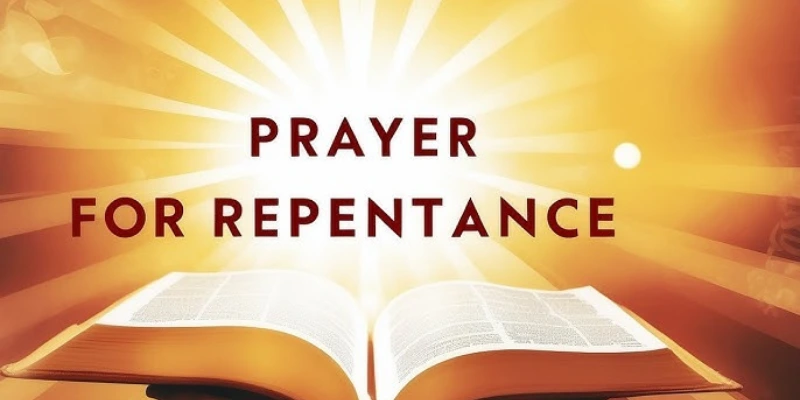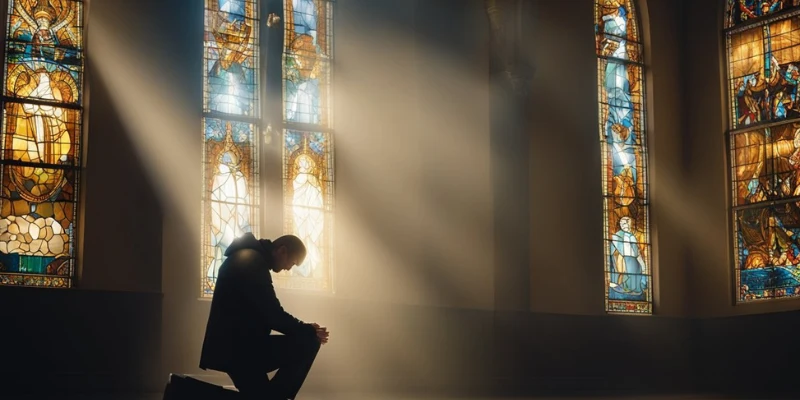Prayer of Repentance: A Path to Healing and Restoration
Updated: December 8, 2024
5
Repentance is a central spiritual practice in many religions around the world. It provides an opportunity for personal reflection, growth, and the restoration of one’s relationship with God. The prayer of repentance is an act of humility, seeking forgiveness, and cleansing one’s heart from sins. The prayer of repentance is understood and practised in different faiths, including Islam, Christianity, Catholicism, and Eastern Orthodoxy. Whether you are looking for a simple prayer of repentance or a more profound spiritual journey, this article will guide you through the many aspects of this important prayer.
What is the Prayer of Repentance?
The prayer of repentance is a heartfelt prayer expressing sorrow for one’s sins, seeking forgiveness, and desiring spiritual renewal. In many traditions, repentance is essential for cleansing the soul and restoring one’s relationship with God. It involves acknowledging and confessing sins, turning away from them, and committing to change. Repentance is not simply about asking for forgiveness but about genuinely feeling remorse for actions that have caused harm to oneself or others and striving to make amends. It’s about recognizing our flaws and seeking divine assistance in becoming better people. The prayer of repentance becomes a tool to express this process, offering an open and vulnerable moment to reconnect with God’s grace.

Why a Prayer of Repentance Matters
Repentance and the prayer that accompanies it are significant for several reasons:
- It Brings Healing: A prayer of repentance is a way to release guilt, shame, and the emotional weight of mistakes. It opens the door to emotional and spiritual healing.
- It Fosters Self-Awareness: When we pray a prayer of repentance, we reflect on our actions and choices. This process encourages self-awareness and helps us learn from our mistakes.
- It Deepens Faith: Repentance strengthens our relationship with our faith and deepens our spiritual journey. It reminds us of our need for divine help and guidance.
- It Encourages Personal Growth: A true prayer of repentance isn’t just about asking for forgiveness and desiring transformation. It’s an opportunity to turn away from destructive behaviours and towards healthier, more loving actions.
The Prayer of Repentance in Islam
In Islam, repentance is known as Tawbah (توبة), and it is highly important. Islam teaches that no one is beyond God’s mercy and that sincere repentance can wipe away all sins. The Quran and Hadiths emphasize the value of repentance, urging believers to turn to Allah whenever they fall into sin.
The Process of Tawbah
Repentance in Islam involves several steps:
- Recognition of the Sin: Acknowledging that one has sinned is the first step in the process.
- Sincere Regret: A person must feel true remorse for their actions.
- Commitment to Change: Creating a firm answer to avoid repeating the wrong.
- Asking for Forgiveness: Praying to Allah for mercy and forgiveness.
- Restitution: Where possible, make reparations or undo the harm caused.
“اللهم إني تبت إليك من كل ذنب” “Allahumma inni atubu ilayk min kulli dhamb” “O Allah, I repent to You from all my sins.”A common prayer of repentance in Islam is
This prayer is simple but powerful, conveying the sincerity of the individual’s repentance.
Prayer of Repentance in Christianity
In Christianity, repentance is an essential aspect of faith. It’s seen as the first step toward healing, Reconciliation, and spiritual renewal. The Bible emphasizes the importance of confessing sins and seeking God’s forgiveness. Repentance is about apologizing and changing one’s heart and actions in alignment with God’s will.
Prayer of Repentance in the Bible
The Bible offers numerous verses that highlight the importance of repentance. These verses encourage believers to turn back to God and seek forgiveness through prayer:
“If we confess our sins, He is faithful and just to forgive us our sins and to cleanse us from all unrighteousness.”1 John 1:9
“The sacrifices of God are a broken spirit; a broken and contrite heart, O God, You will not despise.”Psalm 51:17
“Repent therefore, and turn back, that your sins may be blotted out.”Acts 3:19
Short Prayer of Repentance in Christianity
A short prayer of repentance in Christianity might go like this:
“Dear Lord, I am truly sorry for my sins. Please forgive me and help me change. Amen.”
Though simple, this prayer is profound. It acknowledges wrongdoing, asks for forgiveness, and calls on God for help in transformation.
Prayer for Repentance and Cleansing
The desire for cleansing is central to repentance in Christianity. A prayer for repentance and cleansing often focuses on renewing the heart and mind. Here is an example:
“Father, I come before You with a humble heart. I confess my sins and seek Your forgiveness. Cleanse me from all unrighteousness and create a clean heart, O God. Renew my spirit and help me walk in Your ways.”
This prayer emphasizes the need for divine intervention to purify the heart and enable a person to lead a life aligned with God’s will.
Prayer for Repentance and Forgiveness
A more formal prayer for repentance and forgiveness in Christianity might be:
“Lord, I confess my sins before You and ask for Your mercy. Forgive me for my transgressions and cleanse me of all unrighteousness. Help me walk in Your light and reflect Your love in all I do. Amen.”
The Prayer of Repentance in Catholicism
In Catholicism, repentance is deeply intertwined with the sacrament of Reconciliation, also known as Confession. During this sacrament, Catholics confess their sins to a priest, who offers absolution in the name of God. However, personal prayers of repentance are also important for Catholics to express their sorrow for sins and ask for divine forgiveness.
The Act of Contrition
Catholics often recite the Act of Contrition as part of their repentance practice. It is a prayer that expresses both sorrow for sin and a desire for God’s forgiveness:
“O my God, I am heartily sorry for having offended Thee, and I detest all my sins because I dread the loss of Heaven and the pains of Hell, but most of all because they offend Thee, my God, Who art all good and deserving of all my love. With the help of Thy grace, I firmly resolve to confess my sins, do penance, and amend my life. Amen.”
Deep Repentance Prayer: A Journey of Transformation
Some people need to pray deeply and reflect on their lives more intensely. Deep repentance prayer involves acknowledging the profound consequences of one’s actions and turning to God with a heart that seeks forgiveness and change.
A deep repentance prayer might be:
“O Lord, I stand before You in humility, recognizing the weight of my sins. My heart is broken, and my soul is burdened by the wrongs I have committed. I ask for Your mercy and beg You to cleanse me from all unrighteousness. Purify my heart and restore my spirit so I may walk in Your light and live a life honouring You. Help me to never return to my old ways, but to grow in Your grace and love. Amen.”

Prayer of Repentance in Eastern Orthodoxy
In Eastern Orthodoxy, repentance is seen as a one-time act and a continuous spiritual journey. It is considered a central element of the Orthodox faith and is often expressed through prayer, fasting, and seeking Reconciliation with God.
The Jesus Prayer
The Jesus Prayer is commonly used in Orthodox Christianity to seek repentance and God’s mercy. The prayer is simple but profound:
“Lord Jesus Christ, Son of God, have mercy on me, a sinner.”
This prayer can be repeated throughout the day to focus the mind on God and seek His mercy. It is a powerful expression of humility and a deep recognition of one’s need for God’s forgiveness.
A More Extended Repentance Prayer in Eastern Orthodoxy
A more detailed prayer of repentance in the Orthodox tradition might go as follows:
“O Lord, I have sinned against You and am unworthy of Your love. But I trust in Your infinite mercy and ask for Your forgiveness. It cleans my soul and helps me avoid my sinful ways. Grant me the strength to live a life that is pleasing to You and renew my spirit through Your grace. Amen.”
The Benefits of Repentance
Repentance, when practised with sincerity, brings about numerous spiritual benefits:
Healing of the Soul
Repentance heals the soul by releasing guilt and allowing individuals to experience divine forgiveness. This emotional and spiritual cleansing leads to peace of mind and heart.
Restoration of Relationship with God
Repentance is a means of restoring one’s relationship with God. It opens the door to Reconciliation and deepens the bond between the believer and the divine.
Personal Growth and Transformation
Repentance leads to personal growth by encouraging self-reflection and a commitment to change. It is a step toward becoming a better version of oneself, aligned with divine principles.
Peace and Reconciliation with Others
Repentance also helps mend broken relationships with others. Acknowledging wrongdoings and seeking forgiveness can rebuild trust and harmony in our relationships.
Conclusion
A prayer of repentance is more than just a ritual or a set of words—it’s a transformative journey. It’s a chance to look at ourselves honestly, admit our shortcomings, seek forgiveness, and commit to becoming better people. We heal our hearts, strengthen our relationships, and move forward with renewed purpose. Praying for the first time or returning to a practice you’ve neglected, know that repentance is a gift. It’s an opportunity to grow closer to your faith, those you love, and your truest self. So, take a moment to pause, reflect, and offer a prayer of repentance—knowing that healing, forgiveness, and transformation are waiting for you.
FAQs
What is a prayer of repentance?
A prayer of repentance is a heartfelt expression where an individual acknowledges their wrongdoings, expresses remorse, asks for forgiveness, and commits to changing their behaviour. It is a way to seek Reconciliation with God, others, and oneself.
Do I need to pray for repentance every time I make a mistake?
Repentance is an ongoing process, and praying can be helpful whenever you need to reflect on your actions. The prayer is a way to seek forgiveness and express a genuine desire to change, making it a valuable tool for healing and growth.
Can a prayer of repentance bring forgiveness?
Yes, most faith traditions teach that a sincere prayer of repentance is met with forgiveness from God or a higher power. Repentance is not just about asking for forgiveness but also about genuinely desiring change and growth.
How do I know if my repentance is sincere?
Sincerity in repentance is shown through genuine remorse, acknowledgement of your mistakes, and a commitment to change. If you feel deep sorrow for your actions and are willing to take steps to improve, your repentance is likely sincere.
Is there a specific way to pray a prayer of repentance?
There is no one-size-fits-all way to pray a prayer of repentance. However, it generally includes acknowledging your wrongs, expressing regret, asking for forgiveness, committing to change, and closing with gratitude. The key is to be honest, humble, and open in prayer.
Please Write Your Comments